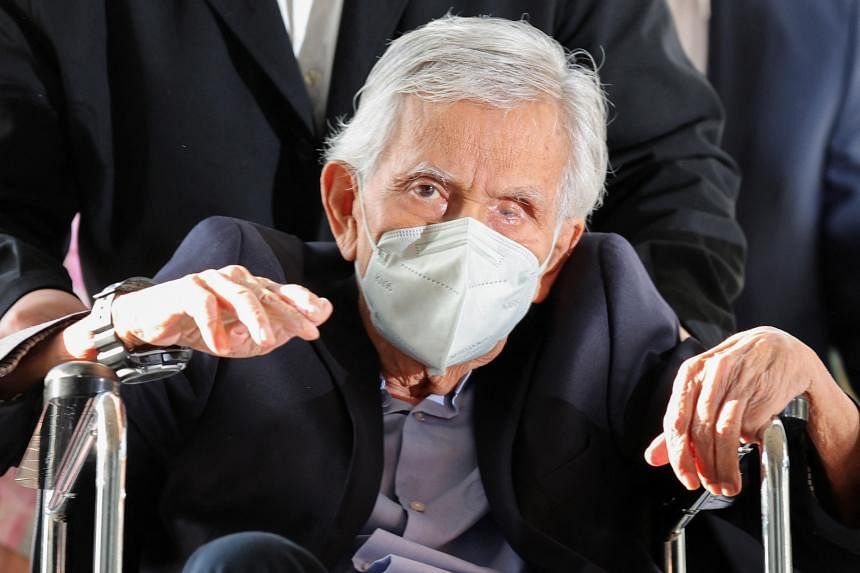Former Malaysian finance minister Daim Zainuddin, 85, cut a pitiful figure when he arrived in a Kuala Lumpur court on Jan 29 in a wheelchair to face charges.
The two-time finance minister was alleged to have failed to declare his assets, which comprised 38 companies and 25 properties in KL, Selangor, Pahang, Negeri Sembilan, Perak and Kedah, as well as a bank account and seven luxury cars, including a Rolls-Royce.
Daim had said in December that the investigations by the Malaysian Anti-Corruption Commission (MACC) were politically motivated.
The anti-graft body said the probe was linked to the release of the Pandora Papers by the International Consortium of Investigative Journalists (ICIJ), which revealed offshore accounts of present and past leaders from around the world.
Daim pleaded not guilty and was given bail at RM280,000 (S$79,300) with no additional conditions after his lawyer told the court that he is “not going anywhere” owing to his health condition.
If found guilty, he faces a maximum jail term of five years and a RM100,000 fine, with the next mention set for March 22.
Here are five things to know about the businessman-turned-politician.
1. Meteoric rise in politics
Daim was finance minister from 1984 to 1991 and rejoined the Cabinet between 1998 and 2001, following the sacking of then finance minister Anwar Ibrahim, who is now Prime Minister.
Daim’s handling of Malaysia’s purse strings came as the world underwent financial crises, but his political career started before that.
In December 1980, then Prime Minister Hussein Onn appointed him as a senator, before he contested the Kuala Muda parliamentary seat in April 1982.
Barely two years later, he was named finance minister by then Prime Minister Mahathir Mohamad.
During his two ministerial stints, he was credited with steering Malaysia out of recessions
2. Lifelong scholar
At the age of 81, Daim obtained a PhD from Universiti Malaya in 2019 after submitting his thesis about the implementation of Malaysia’s New Economic Policy and its effects between 1970 and 2008.
It took him 11 years to complete his thesis, with his convocation was attended by his wife, five children, six grandchildren and one great-grandchild.
But even before that, he had an educational background that was atypical for those born in his era.
He started at Seberang Perak Malay School and later attended Sultan Abdul Hamid College, which taught lessons in English, and completed his upper secondary education at St Xavier’s Institution, which also holds lessons in English.
For 18 months after that, he studied law at Lincoln’s Inn in London before being called to the English Bar in 1959 at the age of 21.
In 1977, he enrolled in the University of California, Berkeley, to pursue a Master in Urban Planning. Fourteen years later, he became a visiting scholar at the Harvard Institute of International Development.
He became a visiting fellow at Cambridge University between 2002 and 2003.
3. Close allies with Mahathir
As Kedah natives, Daim and Tun Dr Mahathir have been friends for decades.
When Dr Mahathir became president of the United Malays National Organisation (Umno) and prime minister in 1981, Daim was appointed the head of the party’s investment arm, Fleet Holdings, the following year.
The two have enjoyed a close relationship over the decades, with Daim being brought back into politics after Dr Mahathir became prime minister again in 2018.
The statesman established a five-man Council of Eminent Persons three days after the Pakatan Harapan government took power to advise the government on economic and financial matters.
The council was led by Daim, and its other members were former central bank governor Zeti Akhtar Aziz, former CEO of state oil company Petronas Hassan Marican, business tycoon Robert Kuok, and prominent economist Jomo Kwame Sundaram.
4. History with Anwar
Once touted as Dr Mahathir’s protege, Datuk Seri Anwar had previously been finance minister in 1991 after Daim left office the first time around.
Two years later, Mr Anwar was appointed deputy prime minister, with the top job all but certain. But in 1998, the heir-apparent was sacked after a rift with his mentor over economic policy.
In the lead-up to the sacking, Daim was economic adviser to the Malaysian government, with The Washington Post reporting in 1998 that he had reversed most of Mr Anwar’s economic policies, which were in line with recommendations made by the International Monetary Fund.
Their relationship has been tenuous over the years, with Mr Anwar saying in a press conference in July 2022 that Daim will have “sleepless nights” if he were to become prime minister.
Mr Anwar’s comments were in response to Daim’s criticisms and calls for his retirement from politics.

5. Incredibly wealthy
Although his total net worth is not known, information revealed in court has painted Daim as a man of great wealth.
Daim ventured into business in 1969 and founded property development firm Syarikat Maluri, he said in court documents. The firm developed two townships in Kuala Lumpur.
In 1981, Daim bought Indo-Suez bank, which was renamed the Malaysian-French Bank. He later exchanged his majority stake in the Malaysian-French Bank for a smaller stake in the United Malayan Banking Corporation, then the second-largest bank in Malaysia.
In an affidavit, Daim said he had controlling or substantial interests in many public-listed companies, including SimeUEP, now known as Sime Darby, Guthrie, TV3, Maybank, Consplant, Cold Storage and Nestle Malaysia.
His family owns the 60-storey Ilham Tower in KL, which was built at an estimated cost of US$580 million (S$778 million). The tower was seized by the authorities on Dec 18.
On Jan 17, the ICIJ said it had obtained documents from a Cayman Islands financial services firm which showed that his two younger sons and his wife were the beneficiaries of a trust that held assets worth US$52.5 million as recently as 2020.


